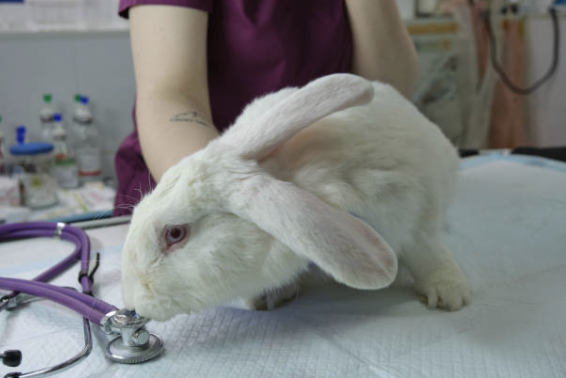Our veterinary clinic offers pet owners compassionate care when their furry family member's health is at risk, so they can ensure the happiness and well-being of their loved ones.

A healthy rabbit requires a constant supply of good quality fresh grass or hay, which should make up 80% of their diet. Leafy greens like broccoli and cabbage should also be included, while treats like carrots and fruit should only be given in small amounts. Pellets or mixes should be considered a treat, and rabbits must always have access to clean water.


Desexing is recommended at 4-6 months of age for both does & bucks. This may help to prevent disease & avoid territorial soiling of your house & other behavioural problems.Rabbits require annual vaccination against calicivirus. If their first vaccination is received prior to 12 weeks of age, a booster is required 4 weeks later.
Pet rabbits need daily exercise outside of their hutch, as the hutch should only serve as a temporary enclosure. It should provide shelter from the elements and a space for the rabbit to exhibit natural burrowing behavior. Bedding like hay, straw, or shredded paper should be changed frequently.


Do not mix guinea pigs with rabbits as their dietary requirements differ and they can transmit diseases or bully each other. It's recommended to keep multiple rabbits together, such as two females, a male and female, or neutered mixes. When handling rabbits, be cautious as they can kick and scratch with their hind legs, causing injury.
Guinea pigs are herbivores with continuously growing teeth and are naturally copraphagic. They require a diet of grass or hay, leafy greens, and small amounts of high-quality pellets. A dietary source of vitamin C is essential and can be found in fresh greens, citrus fruits, or kiwi. Avoid giving them cereals, grains, nuts, seeds, corn, beans, peas, breads, biscuits, or processed human foods.


Guinea pigs can be housed in various types of cages, but they are sensitive to heat and can experience heat stress. It's crucial to keep them in a cool area and provide hiding places like overturned boxes. At least two dripped water bottles should also be available for them.
Keeping guinea pigs alone is not advisable since they are social animals. It is not recommended to mix them with rabbits as they can contract diseases from each other. Guinea pigs may need their coats groomed regularly and their nails clipped occasionally.

Ferrets are strict carnivores and need a high-protein, low-carbohydrate diet. High-quality kitten dry food meets their nutritional requirements, and weekly raw meaty bones help keep their teeth clean. Clean, fresh water should be available at all times in water bottles or heavy bowls.


Ferrets need to be vaccinated against canine distemper. Two vaccinations are required if the ferret is less than 14wks old & thereafter a yearly booster vaccination.Ferrets need to be on a heartworm prevention such as Advocate.
Desexing is recommended for males & is a MUST for females from around 6 months of age (before their first heat).It is a good idea to quarantine any new ferrets for at least 4wks before introducing them to your other ferrets.
Ferrets need to be caged when unsupervised, but they also require daily playtime in a safe area. They enjoy exploring and benefit from regular rearrangement of their cage furnishings and the provision of objects like boxes and plastic tunnels. Ferrets are sensitive to heat stress, so it's essential to keep them in a cool area.


Ferrets may nip or bite during play and should be taught not to bite people from a young age. If necessary, they can be gently scruffed by holding them up from the back of the neck to calm them down, combined with a verbal "no" if they have bitten.